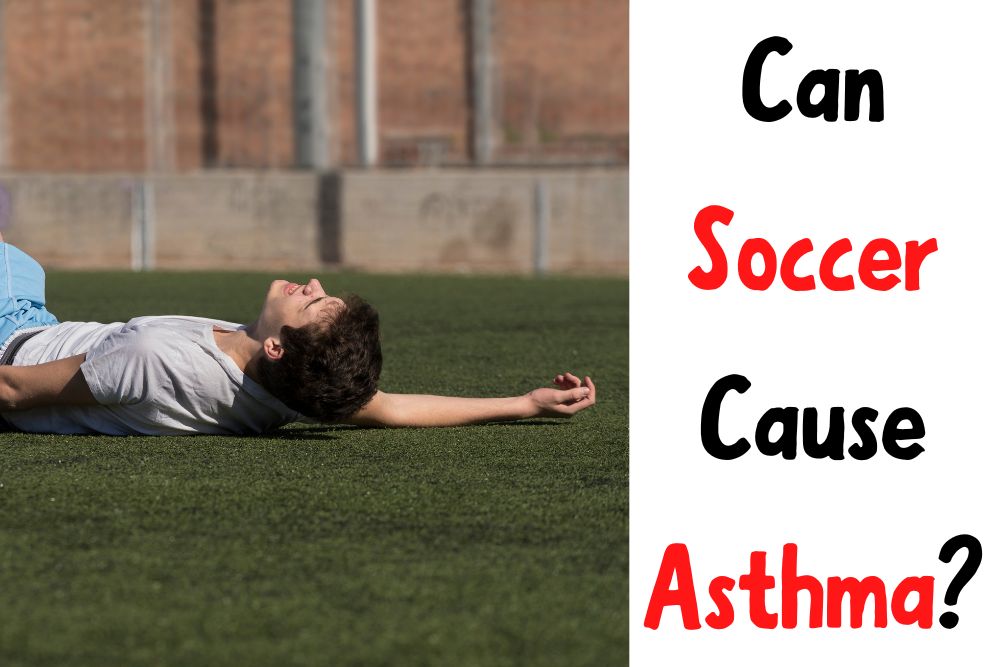Asthma is a lung disease where the airways become swollen, get narrower, and are blocked by excessive mucus secretion making it hard for the person to breathe. Also called bronchial asthma, the condition is a progressive condition and can only be managed with the right medication.
According to Cleveland Clinic, over 25 million Americans (including over 5 million children) are currently battling with asthma. If not properly managed, asthma can be fatal. But, can soccer cause asthma?
Key Takeaways
- Asthma is a medical condition that affects the airways and makes it hard for the patient to breath
- Asthma can be triggered by exercise, air pollutants, allergies to pets and pests, smoke from tobacco, and strong chemical smell
- Common signs of asthma include wheezing, shortness of breath, night coughs, and tightness and pain in the chest
- Playing soccer can help improve your physical fitness and make it easier to manage your asthma
So, to answer that question, soccer doesn’t cause asthma but can trigger an onset of attack in those that already have asthma. However, the reason why you are asking this question is that you are already having signs of the condition or have a family member suffering from the condition.
Perhaps, what you really want to know is if there are certain actions that you will take during soccer that will trigger the condition. So, how exactly can soccer trigger asthma? Keep reading to find out.

Quick Navigation
Can soccer cause asthma?
Sports that involve intense aerobic workouts can trigger what is known as exercise-induced asthma symptoms. Sadly, soccer is one of the sports that have been fingered to cause this problem.
Others include ice hockey, long-distance running, basketball, skiing, and cross-country. So, what exactly is exercise-induced asthma and how can soccer trigger it?
Strenuous exercises like soccer will cause the airways to get narrower. People with exercise-induced asthma will also experience an inflammation of the lungs as well as excess production of mucus.
It is not yet clear what causes this inflammation and excess mucus secretion. That is why you may struggle to catch your breath after running a distance that you are not used to running.
Some people breathe through their mouths to allow more air to get into their lungs. However, by doing so, you will be letting cold and dry air into your lungs which can increase your crisis.
When breathing through the nose, the nose adds moisture and warmth to the air—benefits you don’t get when you breathe through your mouth. The American Academy of Allergy, Asthma, and Immunology (AAAAI) explained that breathing in cold, drier air can trigger exercise-induced asthma.
In fact, WebMD pointed out that those who never had asthma can still experience symptoms of exercise-induced asthma.
The only difference in their case is that they will not have lung inflammations and their condition is not considered ‘true’ asthma. This category of people will not react to other common asthma triggers.
The cause of exercise-induced asthma in people that don’t normally have asthma is unclear but appears to be associated with water or heat loss or both. However, the condition is usually more severe in almost everyone with chronic asthma.

Which type of soccer can cause asthma?
While all forms of soccer can trigger exercise-induced asthma, the risk of a severe asthma attack is higher in some forms of soccer than the others. Players of indoor soccer are less likely to experience an attack compared to players of outdoor soccer—and we will tell you why.
- Indoor Soccer
Indoor soccer is played in an enclosure where the temperature and air quality can be controlled. If you read about the origin of indoor soccer, you will discover that it was formed to allow soccer players and fans to enjoy the game during the cold winter season.
As experts pointed out, the airways can become narrow when cold and dry air is inhaled. The indoor soccer arena is usually warm—especially when packed with soccer fans.
Also, the chances of inhaling pollen and other air pollutants that may trigger asthma are lower in indoor soccer.

- Outdoor Soccer
Players suffering from asthma have a higher chance of experiencing an attack when playing outdoor soccer because they are exposed to more triggers that are often not found in indoor soccer.
For example, outdoor soccer is played in an open field. In association football, that field is covered with natural grass while in beach soccer that field is covered with beach sand.
Pollen or other air pollutants that can trigger asthma can be blown by the wind into the stadium. For example, Ragweed pollen has been reported to travel 400 miles when the conditions are right.
Also, the temperature outside can change drastically. If you have been a fan of soccer throughout the season, then you must have witnessed instances where the rain started falling midway into the game. Unlike some other sports, the referee will not stop the game unless there is a risk of a thunderstorm.
From pollen to a sudden change in temperature and the intense aerobics required by the game, these conditions create the perfect recipe for an asthma attack.
Those that already show symptoms of asthma may be safer playing sports like surfing, short-distance track and field events, gymnastics, golfing, baseball, and swimming. This is because these sports are often carried out in warm, humid environments or require the horizontal positioning of the body.
But, does that mean kids or teens with asthma cannot play soccer? Definitely not! If properly managed, people with asthma can participate fully in any sport. It starts with sticking to some basic preventive measures.

How can you play soccer with asthma?
In 2009, ex-English soccer legend David Beckham disclosed that he has been battling with asthma. However, it did not stop him from reaching the summit of his career.
Interestingly, it has been shown that getting involved in sports like soccer when you have asthma may be a good strategy to manage the condition because aerobic activities help to strengthen the lungs.
As many experts have said, asthma should never be an excuse not to exercise. If soccer is your favorite sport, you can safely play the game by following the precautions that we have listed below.
Keep your inhaler close
There is no current cure for asthma. However, the condition is usually managed using inhalers containing albuterol or any other bronchodilator recommended by your physician. This medication has proven effective in about 90% of people with exercise-induced asthma.
As a prophylaxis, experts recommend that you use the inhaler 15 minutes before exercising or engaging in soccer training or a game. Once taken, the effect usually lasts between 4 to 6 hours.
If your child has asthma, make sure they always carry their inhaler to soccer training and games. Inhalers can also help to control the symptoms during an attack.
Proper warm-up before soccer training or games
Soccer players are required to do a few minutes of warm-up before training and games. However, in most cases, they are advised to do so to avoid muscle cramps.
Well, if you have a history of asthma, you should take your pre-game warm-up exercises more seriously. Warming up for 10 minutes and gradually increasing the intensity of your exercise can help to prevent exercise-induced asthma.
A warm-up should include jogging, sprinting, and stretching. A proper warm-up should prevent the sudden change in airflow which will likely trigger an attack.
Keep warm when playing in the cold
Indoor soccer may be a better option for those with chronic cases of asthma that can be triggered by colds. However, if you must play outdoor soccer, there are certain guidelines that you need to follow.
Cover your nose and mouth to make sure that you are constantly breathing warm and humidified air. This will help to prevent any crisis.
Breathe through your nose
As the airways become narrower as you increase your work rate in soccer, you may be tempted to breathe through your mouth to let in more air. However, this will only increase your chance of taking in dry and cold air which may exacerbate your situation.
Always breathe through your nose instead of your mouth. There are different ways of breathing while playing soccer and it is paramount that you practice them so that you will get confident with breathing through your nose regardless of how hard it is, particularly when you are having a crisis.
Some of the popular breathing techniques are breathing with the diaphragm, bending over to breathe, rhythmic breathing, and quiet breathing. The right breathing technique can help to calm the symptoms of asthma.

Conclusion
There are different forms of asthma but they all cause difficulty in breathing. Active participation in soccer can trigger what is known as exercise-induced asthma.
Although there is no known cause of asthma, exercise like soccer and some other environmental factors can trigger it. However, having asthma is not a good excuse not to play soccer.
This is because there are ways to effectively manage the crisis. Ironically, exercise is good for asthma patients because it helps to strengthen the lungs as well as keep you fit. The more obese you become, the harder it would be to control your asthma.
Hi there, I’m Jay.
Soccer is everything in my life! My friends and I have created this blog with all our enthusiasm, passion, and understanding after years of playing pro soccer. Hope you will enjoy it!
